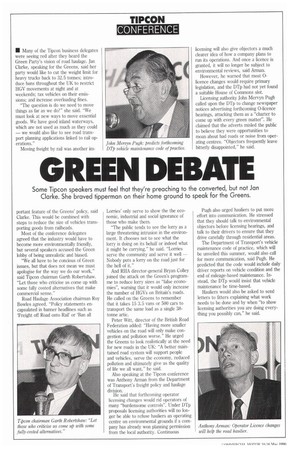GR EEN DEBATE
Page 42

If you've noticed an error in this article please click here to report it so we can fix it.
portant feature of the Greens' policy, said Clarke. This would be combined with steps to reduce the size of vehicles transporting goods from railheads.
Most of the conference delegates agreed that the industry would have to become more environmentally friendly, but several speakers accused the Green lobby of being unrealistic and biased.
"We all have to be concious of Green issues, but that does not mean we must apologise for the way we do our work," said Tipcon chairman Garth Robertshaw. "Let those who criticise us come up with some fully costed alternatives that make commercial sense."
Road Haulage Association chairman Roy Bowles agreed. "Policy statements encapsulated in banner headlines such as 'Freight off Road onto Rail' or 'Ban all Lorries' only serve to show the the economic, industrial and social ignorance of those who make them.
"The public tends to see the lorry as a large threatening intrusion in the environment. It chooses not to see what the lorry is doing on its behalf or indeed what it might be carrying," he said. "Lorries serve the community and serve it well — Nobody puts a lorry on the road just for the hell of it."
And RHA director-general Bryan Colley joined the attack on the Green's programme to reduce lorry sizes as "false economies", warning that it would only increase the number of HGVs on Britain's roads. He called on the Greens to remember that it takes 15 3.5 vans or 500 cars to transport the same load as a single 38tonne artic.
Peter Witt, director of the British Road Federation added: "Having more smaller vehicles on the road will only make congestion and pollution worse." He urged the Greens to look realistically at the need for new roads in the UK: "A better maintained road system will support people and vehicles, serve the economy, reduced pollution and ultimately give us the quality of life we all want," he said.
Also speaking at the Tipcon conference was Anthony Arman from the Department of Transport's freight policy and haulage division.
He said that forthcoming operator licensing changes would rid operators of many "burdensome controls". Under Dip proposals licensing authorities will no longer be able to refuse hauliers an operating centre on environmental grounds if a company has already won planning permission from the local authority. Continuous Pugh also urged hauliers to put more effort into communication. He stressed that they should talk to environmental objectors before licensing hearings, and talk to their drivers to ensure that they drive carefully through residential areas.
The Department of Transport's vehicle maintenance code of practice, which will be unveiled this summer, would also call for more communication, said Pugh. He predicted that the code would include daily driver reports on vehicle condition and the end of mileage-based maintenance. Instead, the DTp would insist that vehicle maintenance be time-based.
Hauliers would also be asked to send letters to fitters explaining what work needs to be done and by when "to show licensing authorities you are doing everything you possibly can," he said.
























































































































